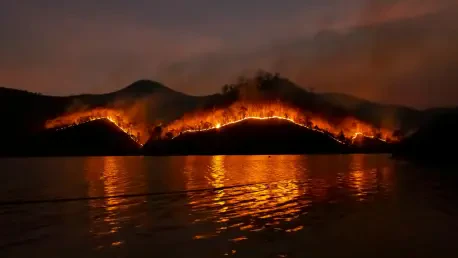In the wake of catastrophic wildfires that have scarred Los Angeles County, countless survivors are grappling with an additional burden beyond the loss of their homes: the struggle to secure the insurance payouts they desperately need to rebuild. These individuals, having endured unimaginable devastation, now find themselves entangled in a battle with insurance companies over delayed or outright denied claims. Their frustration has crystallized into a pointed demand for the resignation of California Insurance Commissioner Ricardo Lara, whom they accuse of favoring industry interests over the needs of policyholders. This growing outcry has sparked a broader conversation about accountability, regulatory oversight, and the systemic challenges plaguing California’s home insurance market in an era of escalating climate risks. As survivors voice their grievances, the debate intensifies over whether a change in leadership can address their immediate plight or if deeper, structural issues are at play.
Survivors’ Struggles and Rising Anger
The personal toll of the wildfires on LA County residents is heartbreakingly evident in the stories of survivors like Jill Spivack and Andrew Wessels, who have become vocal symbols of a widespread crisis. After losing everything to the flames, they’ve faced endless delays and denials from insurers such as State Farm, leaving them in a state of limbo with no clear path to recovery. Their accounts paint a grim picture of feeling utterly abandoned by a system meant to protect them in times of disaster. This sense of betrayal has fueled a deep-seated anger toward Commissioner Lara, with many believing his leadership has failed to hold insurance companies accountable. The emotional weight of their experiences—struggling to secure basic support while navigating bureaucratic hurdles—has transformed personal hardship into a collective call for change, amplifying the demand for his resignation as a necessary step toward justice.
Beyond the individual stories, the scale of the problem becomes even clearer through stark statistics and shared experiences among fire survivors. Surveys reveal that a staggering 70% of policyholders affected by the fires have encountered delays or outright rejections of their claims, while 61% are at imminent risk of losing housing coverage due to unresolved disputes. These numbers underscore a pervasive sense of neglect, as survivors grapple with the dual challenges of financial insecurity and emotional distress. Advocacy groups have rallied behind them, amplifying their voices and highlighting how the current oversight under Lara appears insufficient to address such widespread grievances. This mounting frustration isn’t just about personal loss; it reflects a profound distrust in the mechanisms meant to provide relief, pushing survivors to demand not just resolution but a complete overhaul of leadership to restore faith in the system.
Push for Accountability and Systemic Reform
The call for Commissioner Lara’s resignation is accompanied by a broader push for accountability within California’s insurance framework, driven by survivors and supportive advocacy organizations like the Eaton Fire Survivors Network. These groups are urging the Department of Insurance to expedite investigations into questionable insurer practices, such as unjustified claim denials and slow processing times. Additionally, they’ve demanded a moratorium on approving rate increases for insurance premiums until existing claims are fairly resolved. This stance stems from a belief that policyholders are being squeezed by rising costs while receiving inadequate support in return. The urgency of these demands reflects a growing consensus among affected communities that the current leadership has not acted decisively enough to protect their interests, fueling the argument that a fresh face at the helm could prioritize consumer needs over corporate agendas.
Parallel to these demands, the systemic flaws in the insurance oversight process have come under intense scrutiny, with survivors pointing to specific failures that exacerbate their plight. Reports of the Department of Insurance closing complaints without adequately consulting policyholders—such as in Andrew Wessels’ case—have only deepened mistrust. Critics argue that under Lara’s tenure, there has been a lack of transparency and responsiveness, leaving many feeling unheard and dismissed. Advocacy voices emphasize that reform must go beyond surface-level promises, calling for tangible policies to ensure insurers are held to account. While Lara has initiated some actions, such as investigations into major insurers, many survivors view these steps as too little, too late. The clamor for his resignation, therefore, is not merely a reaction to personal hardship but a demand for a structural shift toward a more consumer-focused regulatory environment.
Climate Risks and the Insurance Market Crisis
California’s home insurance market is caught in a perfect storm of escalating climate risks, with wildfires and other natural disasters reshaping the landscape of coverage and affordability. Experts highlight that the state is not alone in facing these challenges; globally, insurers are grappling with how to manage heightened risks driven by environmental changes. In high-risk areas like LA County, this translates to soaring premiums and diminishing options for homeowners seeking coverage. The situation creates a vicious cycle where insurers pull back from volatile regions, leaving residents vulnerable and fueling the current crisis among fire survivors. This broader context complicates the debate over Lara’s role, as it raises questions about whether any single official can effectively navigate such deep-rooted, systemic issues tied to climate-driven disruptions.
Adding to the complexity, the intersection of climate risks and insurance availability has sparked a heated discussion about long-term solutions versus immediate relief for survivors. While Lara’s reforms aim to stabilize the market by encouraging insurers to expand coverage in wildfire-prone areas, critics argue that these measures may contain loopholes benefiting companies at the expense of policyholders. Meanwhile, independent voices stress that the challenges transcend individual leadership, pointing to the need for innovative approaches, such as public-private partnerships or revised risk assessment models. For fire survivors, however, the urgency lies in securing prompt payouts to rebuild, not in waiting for gradual market adjustments. This disconnect between short-term needs and long-term strategies underscores why many feel that current leadership, under Lara, is not equipped to bridge the gap, intensifying calls for a change at the top to refocus priorities on consumer protection.
Consumer-Industry Divide and Regulatory Challenges
A palpable tension between policyholders and the insurance industry defines the current crisis, particularly in California’s wildfire-ravaged regions. Survivors, having lost homes and livelihoods, find themselves at odds with insurers over claims that are often delayed or denied, leaving them unable to move forward. This rift is not merely anecdotal; it reflects a broader systemic failure where the balance of power seems tilted toward corporate interests. Advocacy groups argue that stronger regulatory oversight is essential to ensure insurers fulfill their obligations, rather than prioritizing profits. While there’s consensus on the need for accountability, opinions diverge on whether ousting Lara would yield meaningful change or if the issues are too ingrained in market dynamics to be resolved through a single leadership shift, highlighting the complexity of the situation.
Compounding this divide is the challenge of navigating regulatory frameworks in a state increasingly prone to natural disasters. The insurance industry, represented by entities like the American Property Casualty Insurance Association, defends the early stage of Lara’s reforms, suggesting that it’s too soon to judge their effectiveness. They caution against rhetoric that might undermine public confidence in ongoing efforts to stabilize coverage. Conversely, survivors and consumer advocates point to past controversies, such as Lara’s initial acceptance of industry campaign contributions (later returned), as evidence of compromised priorities. This back-and-forth reveals a deeper struggle over trust and transparency, with many policyholders feeling that the regulatory body meant to protect them is instead aligned with the very entities causing their distress. The debate over Lara’s resignation thus becomes a flashpoint for larger questions about how to realign the system to better serve those most in need.
Evaluating Leadership: Criticism and Defense
Criticism of Commissioner Lara’s leadership has reached a fever pitch among fire survivors and advocacy groups like Consumer Watchdog, who view him as an ineffective steward of consumer interests. They cite specific grievances, such as the Department of Insurance’s tendency to close complaints without sufficient policyholder input, as indicative of a broader failure to prioritize those in crisis. Past actions, including the acceptance and subsequent return of industry campaign funds, further erode trust, painting a picture of a commissioner too closely tied to the companies he oversees. For these critics, Lara’s resignation isn’t just a symbolic gesture; it’s seen as a critical step toward installing a leader who will unequivocally champion the rights of survivors over corporate agendas, ensuring that the regulatory body serves its intended protective role.
In contrast, Lara and his defenders argue that his tenure should be judged with patience, pointing to recent initiatives as evidence of commitment to addressing survivors’ plights. The commissioner has expressed empathy for the anger felt by fire victims while emphasizing actions like launching an investigation into State Farm and issuing guidelines for proper handling of smoke damage claims. He underscores the collaborative, multi-agency nature of disaster recovery, insisting that resignation is not on the table. Neutral observers, such as Amy Bach of United Policyholders, offer a more measured perspective, warning against focusing energy on removing Lara when systemic market challenges are unlikely to be resolved by a mere change in leadership. This spectrum of views—from sharp criticism to cautious defense—illustrates the nuanced debate over whether Lara’s performance, or lack thereof, is the root issue or merely a symptom of larger, intractable problems.
Path Forward: Balancing Immediate Needs and Long-Term Solutions
Looking back, the intense frustration of LA fire survivors with Commissioner Ricardo Lara stemmed from a profound sense of abandonment during one of the most trying periods of their lives. Their struggles with delayed and denied insurance claims, coupled with a perception of regulatory bias toward insurers, drove a passionate campaign for his resignation. The raw emotion behind their demand was matched by advocacy efforts that sought to expose systemic failures, while Lara’s defense of his reforms and actions highlighted a divide between policy intent and public perception. Experts and industry voices added layers of complexity, framing the crisis as part of a broader clash between climate risks and market realities that no single leader could easily resolve.
Reflecting on this moment, the path forward demanded a dual focus: addressing survivors’ urgent needs while crafting sustainable solutions for California’s beleaguered insurance system. Immediate steps could have included expedited claim reviews and temporary halts on premium hikes to ease the burden on policyholders. Simultaneously, stakeholders needed to explore innovative frameworks, such as enhanced risk-sharing models or stricter regulatory penalties for insurer delays, to prevent future crises. The debate over Lara’s role served as a catalyst for reevaluating how consumer protection could be prioritized in an era of environmental uncertainty, urging policymakers to bridge the gap between short-term relief and long-term stability.









